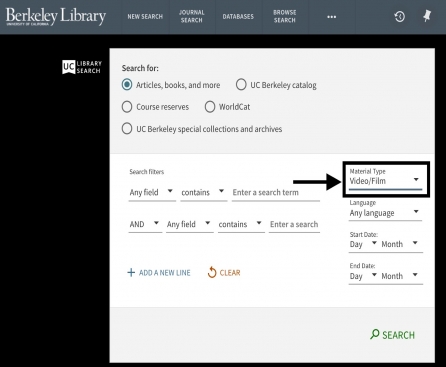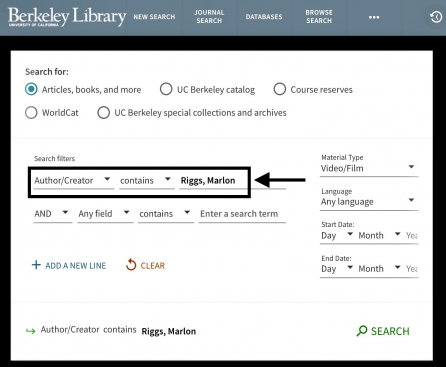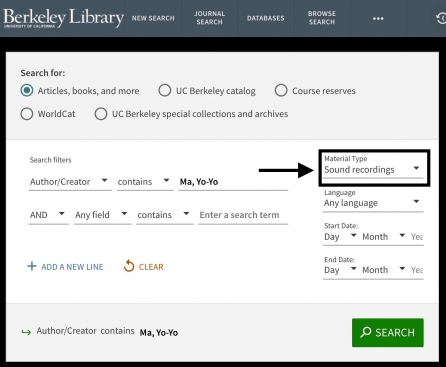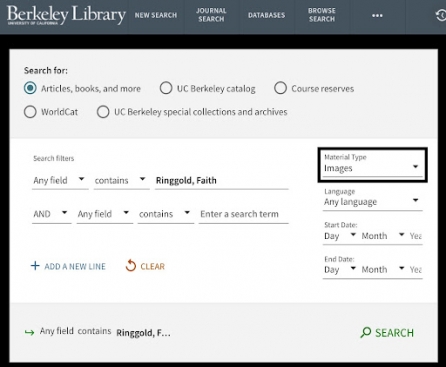Research help: How do I …
Research resources
Find articles
UC Library Search is the Library’s primary search tool for finding books, articles, and more.
A-Z list of all article databases
- Select a subject from the All Subjects filter/menu.
- Select a database type from the All Database Types filter/menu. Examples:
Library research guides by subject
- Click on a link to a subject to see more specific guides that may contain links to applicable article databases.
If you cannot locate an article in Berkeley’s library holdings, you may be able to request it through Interlibrary Loan.
Find books, e-books
- UC Library Search
- Center for Research Libraries
- WorldCat on Firstsearch (libraries worldwide)
- How to read call numbers
- UC Library Search — After you complete your search, under Show Only check Available Online
- E-books at Berkeley
- E-book databases
- ProQuest Ebook Central (formerly ebrary)
- HathiTrust
- Google Books
- Internet Archive
- UC Press E-Books Collection, 1982-2004
Find video, audio
Moving image databases — Browse the Library’s online moving image collections.
Streaming Video Guide for instructors — Highlights Library-provided streaming platforms to support instruction and research.
UC Library Search — For physical and streaming video, under Advanced Search, select Video/Film in the Material Type drop down.

Under Advanced Search, search for directors and artists as an Author/Creator (last name, first).

Sound/Audio databases — Browse the Library’s online sound and audio collections.
Music Library — Many of the Library’s audio recordings are housed in the Music Library. Consult their website for further help researching music and audio topics.
UC Library Search — For streaming and physical audio formats, under Advanced Search select Sound Recordings in the Material Type drop down. You can also search for musicians and artists as an Author/Creator (last name, first).

Image databases — Browse the Library’s online image collections.
Art History/Classics Library — Consult the Art History/Classics Library for help researching image collections.
Image collections — See the Art History/Classics Library guide to image collections.
UC Library Search — For online and physical images, posters, and graphics, under Advanced Search select Images in the Material Type drop down. You can also search for artists and photographers as an Author/Creator (last name, first).

Visit our Research Help portal to chat with a librarian, contact a specialist, or schedule an appointment.
Cite sources
Plagiarism is a form of academic dishonesty, violating the Berkeley Campus Code of Student Conduct. According to the Code:
“Plagiarism includes use of intellectual material produced by another person without acknowledging its source.”
Plagiarism is a serious violation of academic and student conduct rules and is punishable with a failing grade and possibly more severe action.
Whenever you quote or base your ideas on another person’s work, you must document the source you used. Even when you do not quote directly from another work, if reading that source contributed to the ideas presented in your paper, you must give the authors proper credit.
Citations allow readers to locate and further explore the sources you consulted, show the depth and scope of your research, and give credit to authors for their ideas. Citations provide evidence for your arguments and add credibility to your work by demonstrating that you have sought out and considered a variety of resources. In written academic work, citing sources is standard practice and shows that you are responding to this person, agreeing with that person, and adding something of your own. Think of documenting your sources as providing a trail for your reader to follow to see the research you performed and discover what led you to your original contribution.
By following these guidelines, you avoid plagiarism, which is a serious violation of the Code of Student Conduct.
Citations within your text link specific passages to the sources you consulted or quoted. This can be done through in-text parenthetic notes, footnotes, or endnotes. In addition, a bibliography or list of works cited is almost always placed at the end of your paper. The citation system and format you use will be determined by the citation style you choose. Ask your instructor which style should be used, and if there are other special formatting instructions you should follow.
- How to Read Citations
- APA style guide (Purdue)
- MLA style guide (Purdue)
- Chicago style guide (Purdue)
- Full Chicago Manual online (UC Berkeley access only)
- Chicago Manual in print
- AMA full style guide online
- Turabian manual in print
- How to cite film, video and online media
Citation management software can help organize research results and make writing papers easier by creating properly formatted bibliographies and footnotes.